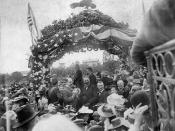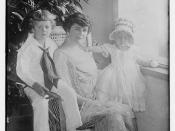The Kiss, by Kathryn Harrison, and In Cold Blood, by Truman Capote, depict the destructive role that dysfunctional relationships between parents and their children play in the ultimate shaping of personalities. In both books, the authors emphasize the severe consequences of an emotionally and physically abusive primary relationship. Living in a cold and isolated home with her mother, Harrison becomes emotionally unstable and spends her life unsuccessfully trying to take revenge on her mothers failures. Perry Smith, in In Cold Blood, grows up in a poor home surrounded by violence and eventually acts out his anger in a brutal murder. During his testimony, he describes his childhood memories every single one punctuated with a beating.
It was inevitable for people like Harrison and Perry, who were raised in homes without positive emotion or even basic morals, to become involved in such horrific acts.
Harrisons father, "whose existence is never acknowledged" (5), was forced away from the family shortly after Harrison was born.
As a result, she was raised by her mother and grandparents. Tragically, none of these figures nurtured Harrison, leading her to describe her childhood as one of "female warfare and tricky, shifting alliances." (36) Her grandfather denied her any attention as soon as she reached puberty, effectively abandoning his granddaughter at a crucial moment. This sudden rejection was a source of great sadness for Harrison, because the two had had an extremely close relationship. The grandmother, for her part, is described as a woman who needed total power. Finally, Harrisons mother is agitated and uncomfortable playing the role of both a mother and her father and often simply tries to escape it.
The absence of parental love, particularly male love, in Harrisons early life was the primary reason she became so vengeful. Her unstable childhood offered her no way to deal with her pain. As Kathryn began an affair with her father, an affair she recognized as morally unacceptable, she decided that the injury to her mother would be a perfect vengeance, a vengeance deserved by the mother who never treated her as a daughter. Thus, Harrison places revenge above her own dignity.
Harrisons perverse act of revenge does not come without warning. Throughout the book, Harrison tries to gain the attention of her "blinded" mother.
She stands by her mothers bedside and watches her mother who will not acknowledge her existence. When her mother moves out of the house when Harrison is still a little girl, her mother, Harrison recalls, is looking for "a life that does not seem possible to her unless motherhood is left behind" (14). All of these examples of a striving for a love that will never be returned scars and weakens Harrison for the rest of her life. Her manipulative father worsens her condition even more and eventually the total absence of love from anyone, which she so longed for, leads to her destructive fate.
Although Perry and Harrison come from unstable backgrounds, adjustment to their situations differ considerably. In the sections discussing Perrys background, the reader learns of endless neglect and abuse, which he suffered for most of his young life. While describing his past, Perry immediately tells us that when he was a boy, he was "scared because [he] thought [his] father was going to hurt [him], and also because he was beating [his] mother" (274). He was in constant danger of physical abuse. He then describes an incident involving his brothers B.B. gun: one time he got so mad he held it to his brothers head and made the sound of shooting. With an environment of violence provided by his parents who are supposed to be his role models, it was inevitable for Perry to grow up and use violence as comfortably as one would go about his everyday activity.
In addition to the parental abuse, he adopted a gang as his family. He describes himself "as free and wild as a coyote" (275). He was in and out of prisons and was continuously sent to detention homes where he was severely beaten and verbally abused. He describes his life as having "no rule or discipline, or anyone to show [him] right from wrong" (275). While not determined by his childhood, it is no surprise that Perry turned to violence, murdering a family. His decisions and actions reflected nothing but his cruel and unruly surroundings.
Harrison and Capote give us lurid pictures of the ways in which a childhood filled with neglect or violence result in reciprocating acts of revenge. Both Harrison and Perry were incapable of feeling any compelling moral restrictions regarding their decisions. Dysfunctional primary relationships should clearly take a large part of the blame for the acts that resulted.





